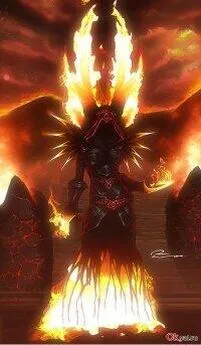The Warlock in Spite of Himself
- Название:The Warlock in Spite of Himself
- Автор:
- Жанр:
- Издательство:неизвестно
- Год:неизвестен
- ISBN:нет данных
- Рейтинг:
- Избранное:Добавить в избранное
-
Отзывы:
-
Ваша оценка:
The Warlock in Spite of Himself краткое содержание
The Warlock in Spite of Himself - читать онлайн бесплатно полную версию (весь текст целиком)
Интервал:
Закладка:
"That's enough." Rod cut him off. "It's a hodgepodge, a conglomeration of styles. Somebody has tried to set up his idea of the ideal world, Fess. Ever hear of the Emigres?"
The robot was silent a moment, mulling through his memory banks. Then he began to recite:
"Malcontents abounded toward the end of the 22nd Century A.D. Bored with their 'lives of quiet desperation,' people turned primarily to mysticism, secondarily to escapist literature and entertainment. Gradually the pseudo-Medieval became the dominant entertainment form.
"Finally, a group of wealthy men pooled their funds to buy an outmoded FTL liner and announced to the world that they were the Romantic Emigres, that they intended to reestablish the glory of the Medieval way of life on a previously-uncolonized planet, and that they would accept a limited number of emigrants in the capacities of serfs and tradesmen.
"There were, of course, many more applicants than could be accommodated. Emigrants were selected 'for the poeticness of their souls'—whatever that may mean."
"It means they loved to listen to ghost stories," said Rod. "What happened?"
"The passenger list was swiftly completed. The thirteen tycoons who had organized the expedition announced that they thereby rejected their surnames and adopted instead the family names of great Medieval aristocrats—Bourbon, di Medici, and so forth.
"Then the ship departed, with its destination care-fully unspecified, so that there would be 'no contamination from the materialist world.' Nothing more was ever heard of them."
Rod smiled grimly. "Well, I think we've just found them. How's that set with your diodes?"
"Quite well, Rod. In fact, a statistical analysis of the probability of this being the Emigres' colony reveals the following—"
"Skip it," Rod said quickly. Statistics was Fess's hobby; given half a chance, he could bore you for hours.
Rod pursed his lips and eyed the section of the hull that housed Fess's brain. "Come to think of it, you might send the statistics back to SCENT with our educated guess that we've found the Emigres' colony. Might as well get at that right now; I'd like them to know where we are in case anything happens."
SCENT, the Society for the Conversion of Extraterrestrial Nascent Totalitarianisms, was the organization responsible for seeking out the lost colonies. The Proletarian Eclectic State of Terra had shown remarkably little interest in any colony that was lacking in modern technology; so that the lost colonies had stayed lost until the totalitarian rule of PEST had been overthrown by DDT, the Decentralized Democratic Tribunal. DDT had quickly consolidated its rule of Terra, governing in accordance with the almost-unattainable goals of Athenian democracy.
It had long been known that the inefficiency of democratic governments was basically a problem of communication and prejudice. But, over a period of two centuries, DDT cells had functioned as speakeasy schoolrooms, resulting in total literacy and masters' degrees for seventy-two percent of the population; prejudice had thus joined polio and cancer on the list of curable diseases. The problems of communication had been solved by the development, in DDT laboratories, of sub-molecular electronics, which had lowered the bulk and price of electronic communication gear to the point where its truly extensive use became practical for the first time. Every individual was thus able to squawk at his Tribune at a moment's notice; and, being educated, they tended to do a lot of squawking just on general principles— all very healthy for a democracy.
Squawking by radio had proved singularly effective, due largely to an automatic record of the squawk. The problems of records and other bureaucratic red tape had been solved by red oxide audio recording tape, with tracks a single molecule in width, and the development of data-retrieval systems so efficient that the memorization of facts became obsolete. Education thus became exclusively a training in concepts, and the success of democracy was assured.
After two centuries of preparing such groundwork, the DDT revolution had been a mere formality.
But revolutionaries are always out of place when the revolution is over, and are likely to prove an embarrassing factor to the police forces of the new government.
Therefore, DDTJiad decided not to be selfish; rather, they would share the blessings of democracy with the other remnants of the old Galactic Union.
But democrats are seldom welcome on planets run by totalitarian governments, and scarcely more welcome on planets where anarchy prevails—this due to the very nature of democracy, the only practical compromise between totalitarianism and anarchy.
What was needed was a permanent organization of revolutionaries, subversive republican democrats. Since there was a large supply of out-of-work revolutionaries on hand, the organization was quickly formed, and christened the Society for the Conversion of Extraterrestrial Totalitarianisms. The "Nascent" was added a century later, when all the known inhabited planets had been subverted and had joined DDT. The old revolutionaries were still a problem, the more so since there were more of them; so they were sent out singly to find the Lost Colonies.
Thus was formed SCENT, the organization whose mission it was to sniff out the backward planets and put them on the road to democracy.
Since Rod had found a medieval planet, he would probably have to foster the development of a constitutional monarchy.
Rod, born Rodney d'Armand (he had five middle names, but they make dull reading) on a planet inhabited exclusively by aristocrats and robots, had joined SCENT at the tender age of eighteen. In his ten years of service, he had grown from a gangling, ugly youth to a lean, well-muscled, ugly man.
His face was aristocratic; you could say that for it—that, and no more. His receding hairline gave onto a flat, sloping forehead that ran up against a brace of bony brow-ridges, somewhat camouflaged by bushy eyebrows. The eyebrows overhung deep sockets, at the back of which were two, somewhat hardened gray eyes—at least Rod hoped they looked hardened.
The eye sockets were thresholded by high, flat cheekbones, divided by a blade of nose that would have done credit to an eagle. Under the cheekbones and nose was a wide, thin-lipped mouth which, even in sleep, was twisted in a sardonic smile. Under the mouth was a square jawbone and a jutting chin.
Rod would have liked to say that it was a strong face, but it tended to soften remarkably when/if a girl smiled at it. Dogs and children had the same effect, with a great deal more frequency.
He was a man with a Dream (There had been a Dream Girl once, but she was now one with his callow youth.)—Dream of one unified Galactic government (democratic, of course). Interstellar communications were still too slow for a true democratic federation; the DDT was actually a loose confederation of worlds, more of a debating society and service organization than anything else.
But adequate communication methods would come along some day, Rod was sure of that, and when they did, the stars would be ready. He would see to that.
"Well, let's be about our business, Fess. No telling when someone might wander by and spot us." Rod swung up and into the air lock, through and into the cabin again. He went to the plate in the wall, released the catches. Inside was a control panel; above this was a white metal sphere with a dull finish, about the size of a basketball. A massive cable grew out of the top of the sphere and connected to the wall of the shop.
Rod unscrewed the connection, released the friction clamp that held the sphere in place, and carefully lifted it out.
"Easy," Fess's voice said from the earphone implanted in the bone behind Rod's right ear. "I'm fragile, you know."
"A little confidence, please," Rod muttered. The microphone in his jawbone carried his words to Fess. "I haven't dropped you yet, have I?"
"Yet," echoed the robot.
Rod cradled the robot "brain" in the crook of one arm, leaving one arm free to negotiate the air lock. Outside again, he pressed a stud in the side of the ship. A large door lifted from the side of the pseudo-asteroid. Inside, a great black horse hung from shock webbing, head between its forelegs, eyes closed.
Rod pressed a button; a crane extended from the cargo space. The horse swung out on the crane, was lowered till its hooves touched the ground. Rod twisted the saddlehorn, and a panel in the horse's side slid open.
Rod placed the brain inside the panel, tightened the clamp and the connections, then twisted the saddlehorn back; the panel slid shut. Slowly the horse raised its head, wiggled its ears, blinked twice, gave a tentative whinny.
"All as it should be," said the voice behind Rod's ear. The horse champed at the bit. "If you'll let me out of this cat's cradle, I'll check the motor circuits."
Rod grinned and freed the webbing. The horse reared up, pawing the air, then sprang into a gallop. Rod watched the robot run, taking a good look at his surroundings in the process.
The asteroid-ship had landed in the center of a meadow, shaggy with summer grass, ringed by oak, hickory, maple, and ash. It was night, but the meadow was flooded with the light of three moons.
The robot cantered back toward Rod, reared to a halt before him. Forehooves thudded on the ground; the great indigo eyes turned to look at Rod, the ears pricked forward.
"I'm fit," Fess reported.
Rod grinned again. "No sight like a running horse."
"What, none?"
"Well, almost none. C'mon, let's get the ship buried."
Rod pressed studs on the side of the ship; the cargo hatch closed, the air lock sealed itself. The ship began to revolve, slowly at first, then faster and faster as it sank into the ground. Soon there was only a crater surrounded by a ring-wall of loam, and the roof of the asteroid curving three feet below.
Rod pulled a camp shovel from Fess's saddlebags, unfolded it, and bent to his task. The horse joined in, flashing out with its heels at the ring-wall. In ten minutes the wall had been reduced to six inch height; there was a large mound of earth in the center, twenty feet across and two feet high.
"Stand back." Rod drew his dagger, twisted the hilt 180 degrees, pointed the haft at the earth-mound. A red light lanced out; the loam glowed cherry red, melted, and flowed.
Rod fanned the beam in a slow arc over the whole of the filled-in crater till the soil had melted down a foot below ground level. He shoveled the rest of the ring-wall into the hole, making a slight mound, but the next rain would take care of that.
"Well, that's it." Rod wiped his brow.
"Not quite."
Rod hunched his shoulders; there was a sinking feeling in his belly.
"You have still to assume clothing appropriate to this society and period, Rod."
Rod squeezed his eyes shut.
"I took the precaution of packing a doublet in my lefthand saddlebag while you were testing the grass, Rod."
"Look," Rod argued, "my uniform will do well enough, won't it?"
"Skintight trousers and military boots will pass, yes. But a pilot's jacket could not possibly be mistaken for a doublet. Need I say more?"
"No, I suppose not." Rod sighed. He went to the saddlebag. "The success of the mission comes first, above and before any considerations of personal comfort, dignity, or—hey!" He stared at something long and slender, hanging from the saddle.
"Hey what, Rod?"
Rod took the strange object from the saddle—it had a handle on one end, he noticed, and it rattled—and held it up where Fess could see it.
"What is this ?"
"An Elizabethan rapier, Rod. An antique sidearm, a sort of long knife, designed for both cutting and thrusting."
Читать дальшеИнтервал:
Закладка:





![Джеймс Купер - Пионеры, или У истоков Саскуиханны [The Pioneers, or The sources of the Susquehannah]](/books/1066142/dzhejms-kuper-pionery-ili-u-istokov-saskuihanny-t.webp)



